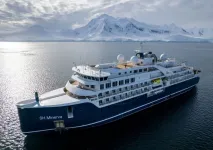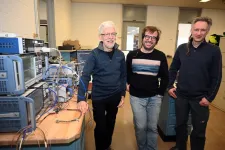(Press-News.org) March 8, 2023, Mountain View, CA – The SETI Institute and Swan Hellenic announce SETI Institute guest lecturers who will offer cruise guests expert insights into the history and latest discoveries in astronomy, astrophysics, astrobiology and planetary science, and the quest to find other forms of life within and beyond our solar system. This quest takes SETI Institute researchers to the planet’s most remote and inhospitable corners to explore life, including Antarctica, where the Swan Hellenic fleet is present for several months every year.
Outlining the agreement with Swan Hellenic, SETI President and CEO Bill Diamond explained, “The SETI Institute’s work brings humanity’s relationship with our planet, our solar system and the Universe beyond into focus. Over 100 Institute scientists strive to understand humankind’s place in the cosmos. Outreach and public engagement are also central to our mission, and we are delighted with the opportunity to have our scientists and thought leaders interact with the curious-minded adventurers who explore with Swan Hellenic.”
The new partnership will engage Swan Hellenic's many adventure travelers with never-before-seen presentations on explorations around Earth and beyond.
Swan Hellenic CEO Andrea Zito commented: “We’re immensely proud of this new partnership. The presence of the SETI Institute’s eminent scientists on board our cultural expedition cruises, imparting their expert knowledge of astrobiology, geology, physics, chemistry and astronomy, completes another facet of the quest to take our guests to see what others don't.”
Seven SETI scientists will travel on Swan Hellenic’s 2023 cultural expedition cruises.
Dr. David Grinspoon
Senior Scientist at the Planetary Science Institute, SETI Institute Science Advisory Board Member
Accompanying: SH Vega, Unspoilt Wilds of Southwest Africa, 3 – 16 April 2023
David is an astrobiologist, award-winning science communicator, prize-winning author and scientist with several interplanetary spacecraft missions, including NASA’s DAVINCI mission to Venus. In 2013, he was appointed as the inaugural Chair of Astrobiology at the Library of Congress. David’s lecture topics will be “An Astrobiology perspective on Our Place in Planetary History,” “Mission to Venus: The Past, Present and Future Exploration of Earth’s Twin Planet,” and “Searching for Life and Intelligence Beyond Earth.
Dr. Simon Steel
Deputy Director of the Carl Sagan Center for Research at the SETI Institute
Accompanying: SH Vega, Lands of the Celts, 23 May – 3 June 2023
Simon is a PhD Astronomer and Astrophysicist who specializes in studying galaxies. He has taught at Harvard University and University College London. Simon’s lecture topic will be “From Shí an Bhrú to JWST: Humanity’s Quest for Meaning and Place in the Cosmos.
Bill Diamond
President & CEO of the SETI Institute
Accompanying: SH Vega, Arctic Islands & Fjords, 2 June – 6 July 2023
Bill has worked predominantly in applied technologies and has over 20 years of experience in photonics and optical communications, plus more than a decade in X-ray and semiconductor processing technologies. Bill’s lecture topic will be “The Search for Life Beyond Earth – How it Works, Where it Stands, and Why it Matters.”
Dr. Margaret Turnbull
SETI Institute Research Scientist
Accompanying SH Diana, Historic Ports of the Western Seaboard, 8 – 17 August 2023
Maggie is an astrobiologist whose expertise is in identifying planetary systems capable of supporting life as we know it. She developed a Catalogue of Habitable Stellar Systems for the search for extraterrestrial intelligence (SETI) and has studied the spectrum of the Earth to identify tell-tale signatures of life. She leads two NASA-funded teams to study the nearest star systems and their prospects for hosting habitable planets. Maggie’s lecture topic will be “Search for life around nearby stars: Will there ever be another Earth?”
Dr. Pablo Sobron
SETI Institute Research Scientist
Accompanying: SH Vega, Greenland in Depth, 26 August - 5 September 2023
Pablo is a research scientist with a PhD in Physics and Technology Materials who worked at the European Space Agency, the Spanish Space Agency and the Universities of Oslo and Valladolid before dedicating himself to developing new technologies at Washington University, McGill University, the Canadian Space Agency, the SETI Institute and NASA. The technologies include all the laser tools we use to explore Mars today. Since 2016, Pablo has led teams of scientists and engineers in projects to deliver solutions to explore and study the deep sea and deep space. Pablo’s lecture will be “Arctic resources and their role in space sciences and the energy transition.”
Dr. Seth Shostak
Senior Astronomer and Fellow at the SETI Institute
Accompanying: SH Vega, Voyage to the Northwest Passage, 5 - 21 September 2023
With degrees in physics and astronomy from Princeton University and Caltech, Seth has a long history of research in radio astronomy and, since 1991, in the Search for Extraterrestrial Intelligence, or SETI. He is a frequent guest and commentator on radio and television. Seth’s lecture topic will be “Looking for Aliens.”
Dr. Dava Newman
Director of the MIT Media Lab, Apollo Program Professor of Astronautics at Massachusetts Institute of Technology (MIT) and Harvard–MIT Health, Sciences & Technology Faculty Member, SETI Institute Board of Trustees Member
Accompanying: SH Vega, Weddell Sea Discovery, 23 December 2023 – 3 January 2024
Dava served as NASA Deputy Administrator (2015-17) – the first female engineer in this role – and was awarded the NASA Distinguished Service Medal. She was also the principal investigator on four spaceflight missions aboard the Space Shuttle, Russian Mir Space Station and International Space Station. She has been to McMurdo base and the South Pole station in Antarctica. Dava’s lecture topics will be “Humanity Becoming Interplanetary: Exploration via Sea and Space”, “Antarctic Extreme Science and Exploration,” and “Antarctica from Air, Sea, and Space: Latest Scientific Results.”
About Swan Hellenic
Swan Hellenic was relaunched in July 2020 to proudly continue the spirit of cultural expedition cruising the company pioneered in the 1950s. Building on its British roots, the new company has a global cultural cruising outlook dedicated to providing guests with the opportunity to see what others don’t.
Swan Hellenic's purpose-built ships feature elegant Scandi-design interiors, extensive outdoor spaces and dedicated expedition facilities. SH Minerva and SH Vega, two new 5-star Polar Code PC 5 expedition cruise ships with ice-strengthened hulls, respectively launched in December 2021 and arriving in July 2022, each accommodates 152 guests in 76 spacious suites and staterooms, the majority with large balconies. A slightly larger PC 6 ice-class vessel, SH Diana, accommodating 192 guests in the same distinctive comfort and style in 96 staterooms and suites, will be arriving in early 2023.
All three ships feature 3 dining venues – the Swan Restaurant, Club Lounge and Pool Bar & Grill – and are being built in full compliance with SOLAS Safe Return to Port requirements. Dedicated to guests with a passion for adventure and cultural exploration, the company’s meticulously planned itineraries explore the wild landscapes, wildlife, peoples and unique cultures of the world’s less travelled regions.
The crews each include a team of 12 seasoned expedition guides, expert speakers and lecturers, for a total complement of 120 and 140 persons respectively, offering outstanding staff-to-guest ratios to deliver the highest standards of attentive personal service.
Headquartered in Cyprus with offices in London, Dusseldorf, Monaco, Fort Lauderdale (serving the North American market), Hong Kong (serving Greater China and South-East Asia), Sydney (serving Australia-New Zealand) and Copenhagen (serving Scandinavia and Iceland), as well as partnerships serving India and Japan, Swan Hellenic supports the travel trade with local specialist partners to provide customers with expert personal service worldwide.
For more information about Swan Hellenic, please visit www.swanhellenic.com
or call +44 (0) 207 846 0271
For Swan Hellenic, please contact:
Patrizia Iantorno, VP of Global Marketing: patrizia.iantorno@swanhellenic.com
For Press, please contact:
Renato Bodi, TwentyTwenty: Tel.+41793746887 renato.bodi@twentytwenty.biz
Media Library:
https://swanhellenic.filecamp.com/s/SH_MINERVA_PHOTOS_15/fo
Interactive World Map of Swan Hellenic fleet itineraries:
https://prezi.com/view/6z9srGQDe0oZXWx0Bciu
About the SETI Institute
Founded in 1984, the SETI Institute is a non-profit, multi-disciplinary research and education organization whose mission is to lead humanity’s quest to understand the origins and prevalence of life and intelligence in the Universe and to share that knowledge with the world. Its research encompasses the physical and biological sciences and leverages expertise in data analytics, machine learning and advanced signal detection technologies. The SETI Institute is a distinguished research partner for industry, academia and government agencies, including NASA and NSF.
Website: https://www.seti.org
Contact information
Rebecca McDonald
Director of Communications
SETI Institute
rmcdonald@seti.org
DOWNLOAD FULL PRESS RELEASE.
END
Swan Hellenic and SETI Institute announce lecturers for Explore Space at Sea Series
SETI Institute speakers set to join Swan Hellenic Explore Space at Sea Series will include David Grinspoon, Simon Steel, Bill Diamond, Margaret Turnbull, Pablo Sobron, Seth Shostak and Dava Newman
2023-03-08
ELSE PRESS RELEASES FROM THIS DATE:
New articles for Geosphere posted early online
2023-03-08
Boulder, Colo., USA: GSA’s dynamic online journal, Geosphere, posts articles online regularly. Topics this month include an analysis of geoscience job applications; Uturuncu volcano, Bolivia; Picture Gorge Basalt; and the Red Bluff Granite Suite. You can find these articles at https://geosphere.geoscienceworld.org/content/early/recent .
Critical workforce skills for bachelor-level geoscientists: An analysis of geoscience job advertisements
G.W. Shafer; K. Viskupic; A.E. Egger
Understanding the skills ...
Human Brain Project: spin-off receives EIC grant to develop energy-efficient AI technology
2023-03-08
The European Innovation Council (EIC) has recently announced that it will award a Transition grant to SpiNNcloud Systems GmbH, a deep-tech startup based in Saxony, Germany.
The team from SpiNNcloud Systems GmbH, a spin-off from Professor Christian Mayr’s research group at Technische Universität Dresden, is receiving a grant of 2.5 million euros for their groundbreaking project, “SpiNNode: SpiNNaker2 on the edge.”
“SpiNNaker2 is a bio-inspired supercomputer which was developed at my Chair in collaboration with Prof. Steve Furber’s research group at the University of Manchester as part ...
New GSA Bulletin articles published online ahead of print
2023-03-08
Boulder, Colo., USA: The Geological Society of America regularly publishes articles online ahead of print. GSA Bulletin topics studied this month include the nature and dynamics of China and Tibet; the Lower Mississippi Valley, USA; and the polarity of Mesozoic arcs along the western margin of North America. You can find these articles at https://bulletin.geoscienceworld.org/content/early/recent .
Magmatic-hydrothermal evolution of long-lived Nb-Ta-(Sn) mineralization in Lianyunshan, NE Hunan, South China
Nuerkanati Madayipu; Huan Li; Safiyanu Muhammad Elatikpo; Michael W. Förster; Hou-Xiang Zhou ...
The ...
Group exercise program for older adults led to more independent exercise despite pandemic restrictions, MU study finds
2023-03-08
COLUMBIA, Mo. -- Sticking with an exercise program can be tough, even during the best of times. But what about during a pandemic?
A new study by the University of Missouri and Oklahoma State University found that even when gyms were closed and there were other COVID-19 restrictions limiting face-to-face meetings, older adults who completed the Stay Strong, Stay Healthy exercise program — created at MU in 2005 — continued to maintain long-term exercise habits independently, which resulted in improved lifestyle changes and an increase in both physical energy and self-confidence.
“We ...
Incident atrial fibrillation appears to heighten dementia risk
2023-03-08
People with a recent diagnosis of atrial fibrillation (AF), the most common irregular heart rhythm, have a modestly higher risk of developing dementia than people without the condition, according to research published today.
“Previous studies that have examined the link between atrial fibrillation and dementia have yielded conflicting results, and we hope that our study’s large sample size helps to establish confidence in our findings,” said Dr. Nisha Bansal, a professor of medicine at the University of Washington School of Medicine. “The study also included a community based, diverse population, which may increase the generalizability ...
Lunar telescope will search for ancient radio waves
2023-03-08
UPTON, NY—Scientists at the U.S. Department of Energy’s (DOE) Brookhaven National Laboratory are leading a new effort to land a radio telescope on the moon. If successful, the project will mark the first step towards exploring the Dark Ages of the universe.
The Dark Ages are an early era of cosmological history starting about 380,000 years after the Big Bang. There were no stars or planets in the Dark Ages. It’s a point in time that scientists have never been able to observe. Though radio waves from the Dark Ages still linger in space, the abundance of radio interference on Earth has masked these signals from scientists seeking to study them.
If ...
How a metabolite causes inflammation and disease
2023-03-08
A new study shows for the first time a connection between a mitochondrial metabolite and the activation of an inflammatory response. Mitochondria are functional units of our cells that fulfil important tasks, i.e. chemical reactions, for the functioning of the cell. One of these tasks is the production of energy that is necessary for cell growth and reproduction. If certain chemical reactions in the mitochondrion change, diseases occur. For example, deficiencies in fumarate hydratase (FH) in the Krebs cycle, one of the most important metabolic pathways in mitochondria, ...
'Other' race/ethnicity linked to higher suicide and overdose risk in military members with mild TBI
2023-03-08
March 8, 2023 – Previous studies have reported high rates of death by suicide and drug overdose – including opioid overdose – in military service members with a history of mild traumatic brain injury (mTBI). A new study finds that those risks are highest among military members with mTBI who identify their racial/ethnic status as "Other," as opposed to standard racial/ethnic categories, reports the March/April issue of the Journal of Head Trauma Rehabilitation (JHTR). The official journal of the Brain Injury Association of America, JHTR is ...
Cancer Grand Challenges announces global research funding opportunity with nine new challenges
2023-03-08
The National Cancer Institute (NCI), part of the National Institutes of Health, and Cancer Research UK have announced nine new research challenges aimed at tackling some of the most profound problems in cancer research. The global funding opportunity is part of the Cancer Grand Challenges program, an initiative launched by NCI and Cancer Research UK in 2020.
The research initiative aims to inspire bold new ideas that have the greatest potential for advancing cancer research and improving outcomes for people affected by cancer. The new round of challenges, announced March 8, 2023, during the Cancer Grand Challenges Annual Scientific Summit in London, is open until June ...
Genes in beans! Bean genome sequenced for improved nutrition
2023-03-08
The faba bean genome, which at 13 billion bases is more than four times the size of the human genome, has been sequenced for the first time and is published today (08 March 2023), in Nature. This is an extraordinary technical achievement and crucial to efforts to breed beans with optimum nutritional content and sustainability of production.
A consortium of scientists from Europe and Australia, led by the University of Reading (UK), Aarhus University (Denmark) and the University of Helsinki (Finland), worked together on this large scale sequencing project.
The project to fully decode the genome went on to test out its usefulness by searching for genes involved ...
LAST 30 PRESS RELEASES:
SfN announces Early Career Policy Ambassadors Class of 2026
Spiritual practices strongly associated with reduced risk for hazardous alcohol and drug use
Novel vaccine protects against C. diff disease and recurrence
An “electrical” circadian clock balances growth between shoots and roots
Largest study of rare skin cancer in Mexican patients shows its more complex than previously thought
Colonists dredged away Sydney’s natural oyster reefs. Now science knows how best to restore them.
Joint and independent associations of gestational diabetes and depression with childhood obesity
Spirituality and harmful or hazardous alcohol and other drug use
New plastic material could solve energy storage challenge, researchers report
Mapping protein production in brain cells yields new insights for brain disease
Exposing a hidden anchor for HIV replication
Can Europe be climate-neutral by 2050? New monitor tracks the pace of the energy transition
Major heart attack study reveals ‘survival paradox’: Frail men at higher risk of death than women despite better treatment
Medicare patients get different stroke care depending on plan, analysis reveals
Polyploidy-induced senescence may drive aging, tissue repair, and cancer risk
Study shows that treating patients with lifestyle medicine may help reduce clinician burnout
Experimental and numerical framework for acoustic streaming prediction in mid-air phased arrays
Ancestral motif enables broad DNA binding by NIN, a master regulator of rhizobial symbiosis
Macrophage immune cells need constant reminders to retain memories of prior infections
Ultra-endurance running may accelerate aging and breakdown of red blood cells
Ancient mind-body practice proven to lower blood pressure in clinical trial
SwRI to create advanced Product Lifecycle Management system for the Air Force
Natural selection operates on multiple levels, comprehensive review of scientific studies shows
Developing a national research program on liquid metals for fusion
AI-powered ECG could help guide lifelong heart monitoring for patients with repaired tetralogy of fallot
Global shark bites return to average in 2025, with a smaller proportion in the United States
Millions are unaware of heart risks that don’t start in the heart
What freezing plants in blocks of ice can tell us about the future of Svalbard’s plant communities
A new vascularized tissueoid-on-a-chip model for liver regeneration and transplant rejection
Augmented reality menus may help restaurants attract more customers, improve brand perceptions
[Press-News.org] Swan Hellenic and SETI Institute announce lecturers for Explore Space at Sea SeriesSETI Institute speakers set to join Swan Hellenic Explore Space at Sea Series will include David Grinspoon, Simon Steel, Bill Diamond, Margaret Turnbull, Pablo Sobron, Seth Shostak and Dava Newman



